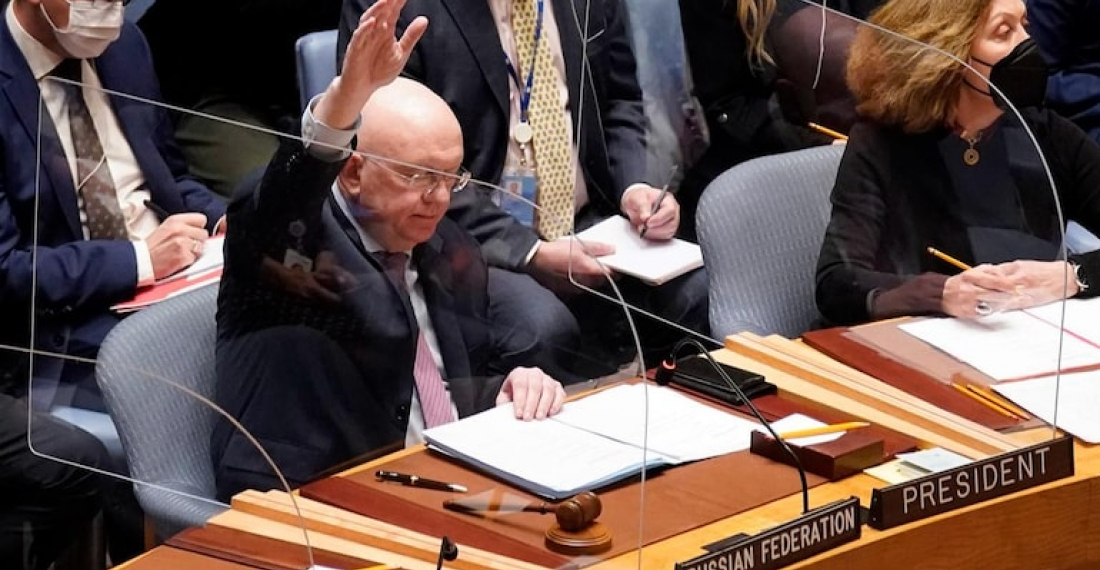For those who are believers in multilateralism and a rules based international system last night's developments in the UN Security Council were a dark and disappointing moment.
The Council considered a resolution put forward by more than sixty UN member states, which strongly condemned Russia’s invasion of Ukraine and called on Moscow to withdraw its troops immediately and provide safe access for humanitarian relief work.
Eleven member countries voted in favor of the resolution, namely, US, France and UK who are permanent members and Albania, Brazil, Gabon, Ghana, Ireland, Kenya, Mexico and Norway, who hold the current two-year rotating membership.
China, also a permanent member and India and the United Arab Emirates abstained.
Russia, which has veto power as one of five permanent members of the council, voted against it and vetoed it. Ironically Russia this month also holds the chairmanship of the Security Council.
“Russia, you can veto this resolution, but you cannot veto our voices,” said the U.S. ambassador, Linda Thomas-Greenfield. “You cannot veto the truth. You cannot veto our principles. You cannot veto the Ukrainian people. You cannot veto the U.N. Charter. And you will not veto accountability.”
The United States had known all along that Russia would veto the resolution. But U.S. officials hoped that by doing so, Russia would demonstrate its isolation and its disregard for the U.N. charter. Russia appeared unfazed. Its ambassador thanked the three countries that had abstained from the vote. He dismissed as a Western conspiracy the diplomatic efforts to hold it accountable.
Diplomats said that the U.N. General Assembly would act next week on a resolution condemning Russia’s war on Ukraine. Countries do not have veto power at the General Assembly, but its resolutions are symbolic and not legally binding, as the Security Council’s are.
The abstention by China was not a surprise. China has taken a both-sides approach to the conflict, calling for defusing of tensions and respect for sovereignty but stopping short of condemning Russia. China has an eye on Russian support in the future when it is its turn to test the international order
But many have found the abstention of India and the United Arab Emirates very disappointing.
Comment by the political editor of commonspace.eu:
The United Nations Security Council is the ultimate guarantor of the international order. The unprovoked invasion of one country by another is the ultimate violation of that world order which the Security Council is supposed to prevent, and in case it cannot, to condemn and try to reverse. In 1990 a united Security Council condemned the invasion of Kuwait by Iraq and authorised an operation to reverse that development.
This time the situation was different. The aggressor was Russia - a UN Security Council permanent member, and a veto was expected. This once more raises questions about the veto power of the five permanent members in UN Councils. Every time it is used it seems to weaken the UN. This time, given the importance of the situation this is even more so.
However what advocates of a multilateral system are more concerned about is the abstention by China, India and the United Arab Emirates. What does it mean when countries want to remain neutral as one country destroys another? China often tries to project itself as the champion of multilateralism - its abstention was hardly a contribution to that.
The abstention of India is even more problematic. A democracy, and a founding member of the Non Aligned Movement, India has often been seen on the right side of history. On Friday evening in New York, it definitely was on the wrong side. It is true India is a long term friend of Russia and the two countries have strong political and military co-operation. But India should not have sacrificed the moral right for dubious strategic benefit. Dubious because as India tries to rebut Chinese ill-intent towards it, it requires the West much more than it needs Russia.
As for the UAE, this was probably the worst foreign policy decision taken since the UAE was established fifty years ago. The UAE leadership have miscalculated the strong feelings at both official and popular level on the situation in Ukraine in Europe and beyond. Pretty much all these countries have always considered the UAE as a friend. Many are asking whether they need to look again if the UAE wants to remain on the side whilst a European country is being swollowed up by a larger neighbour. The UAE takes over the chairmanship of the UN Security Council on Tuesday (1 March) for the whole month of March. As things stand its judgement will be put to the test many times during the coming month. One hopes that the UAE will now take a more principled position.
A wobbly reaction to the Italian invasion of Ethiopia in the 1930's all but killed the League of Nations in the first half of the 20th century. The successor organisation, the United Nations, is more resilient and has justified its existence many times over, but it is clear that the UN needs reform if it is to remain fit for purpose. International relations are entering difficult, uncharted waters. The UN remains one of the most important tools for managing the difficulties ahead. But that can only work if its members act responsibly and do their duty when necessary.
source: commonspace.eu
photo: The Russian envoy to the UN vetoes a resolution on Ukraine at a meeting of the UN Security Council on 25/26 February 2022.






